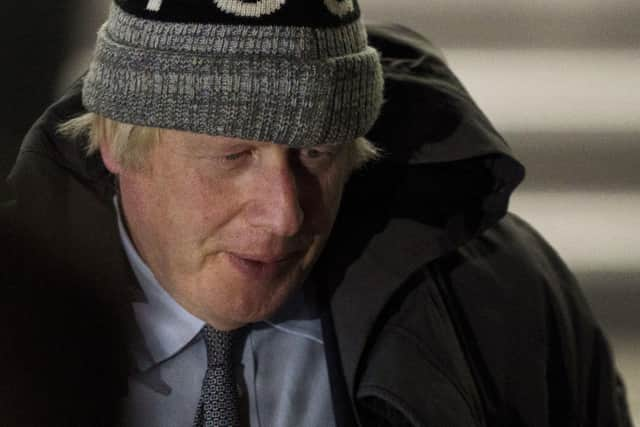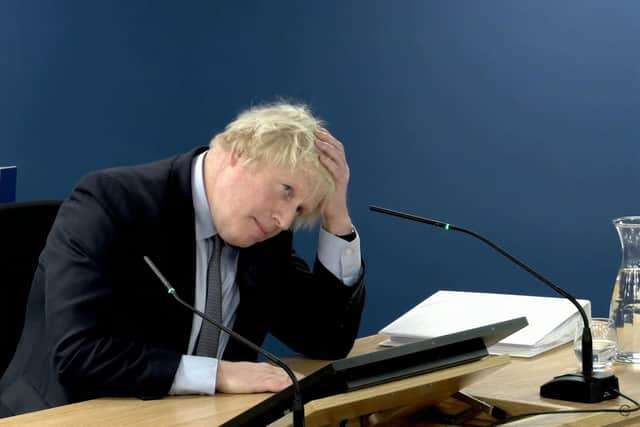Boris Johnson admits 'underestimating' Covid in inquiry appearance dominated by his failures to remember
Boris Johnson’s highly-anticipated appearance before the UK’s Covid-19 Inquiry started badly for the former prime minister. Attempting to open with an apology, he was immediately interrupted by four protesters holding up signs reading: “The dead can’t hear your apologies”.
And that appeared to set the tone for an uncomfortable six hours of questioning for Mr Johnson as counsel to the inquiry, Hugo Keith KC pressed for answers on Downing Street’s ‘toxic’ culture, on the timing of lockdowns, and on relations with the devolved administrations.
Advertisement
Hide AdAdvertisement
Hide AdHe did apologise, and he did admit he should have “twigged much sooner” about the threat posed by Covid-19 in the early days of the pandemic, but he also repeatedly claimed not to remember conversations, and failed to explain how 5000 of his Whatsapp messages had been deleted.


He was unable to say whether former health secretary Matt Hancock had urged him to introduce a lockdown on March 13 2020, he could not answer why he met with the Evening Standard owner Evgeny Lebedev days before lockdown, nor could he give a reason he skipped so many Cobra meetings.
Challenged over claims he had expressed doubts about how fatal Covid was, Mr Johnson answered he could not “recall doing so”. Asked why he was unable to provide the Covid-19 inquiry with any communications from February to June 2020, he similarly did not know where the messages had gone, citing a “technical issue”.
Mr Johnson also defended failing to hold meetings with the leaders of Scotland, Wales and Northern Ireland, claiming it would be “optically wrong”.
He said he thought it would risk being a “mini EU”, giving equal status to the leaders of the devolved administrations, although he said he would have liked them to have delivered a more united UK-wide message during the fight against Covid.


The session saw Mr Johnson admit his Government underestimated the seriousness of the crisis, though the former Prime Minister also suggested his officials were to blame, saying coronavirus “wasn’t really escalated to me as an issue of national concern” as the data emerging from China was misunderstood.
The former MP also dismissed criticism of his leadership, after numerous aides lamented he would veer on the key decisions, delaying a Government response.
He insisted it was his job to “test” the “completely novel policy”, adding: “It matters to the livelihoods of people up and down the land. I had to go through the arguments and that is what I was doing.”
Advertisement
Hide AdAdvertisement
Hide AdNow a columnist, Mr Johnson also defended his eventual decision to order the first lockdown on March 23 2020, saying by the middle of that month he was giving arguments against restrictions “pretty short shrift”.
“I no longer had the luxury of waiting. It was over,” he said.
He said “once the penny dropped” that scientists had been wrong about how rampant Covid already was in the UK “it was pretty fast from flash to bang” in imposing lockdown.
Mr Johnson did not deny questioning why his government was “destroying everything for people who will die anyway soon”, but suggested the comment was not “designed to be publicly broadcast”.
“It’s an indication of the cruelty of the choice that we faced and the appalling balancing act that I had to do throughout the pandemic,” he said when asked about a note written by his former aide Imran Shafi which recorded that he had made the remark.
He said he regretted describing long Covid as “b****s” and “Gulf War Syndrome” in October 2020 notes, acknowledging the “hurt and offence” caused to those suffering from the condition.
But he denied taking a “long” holiday in February 2020, after coming under fire for taking a half-term break at his Chevening country retreat when the virus had exploded in Italy and there were cases in the UK.
He insisted he was “working throughout the period” after it previously emerged there was a 10-day period in which no notes on coronavirus were sent to Mr Johnson nor emergency Cobra meetings held.
Advertisement
Hide AdAdvertisement
Hide AdMr Johnson conceded that, with hindsight, mass gatherings should have been stopped earlier and he should not have shaken hands with patients at a hospital where there were coronavirus cases.
Challenged over the slow response to the unfolding crisis, Mr Johnson said ministers, and he, should have “twigged much sooner” the need for action, adding that it was only when he saw the “horrors” of the outbreak in Italy in February that year that he realised its seriousness.
Mr Johnson suggested the experience of previous diseases such as Sars, Mers and swine flu clouded officials’ judgment while a coronavirus pandemic was “outside our living experience”.
“When you read that an Asiatic pandemic is about to sweep the world, you think you’ve heard it before. And that was the problem.
“But I think it’d be fair to say that the scientific community within Whitehall at that stage was not telling us that – I was not being informed that – this was something that was going to require urgent and immediate action.
“We underestimated the scale and the pace of the challenge.”
The first day of his evidence also saw Mr Johnson defending the culture of his No 10 after other witnesses branded it “toxic”.
It comes after several witnesses, including former Deputy Cabinet Secretary Helen MacNamara and former health secretary Mr Hancock, told Lady Hallett’s probe of concerns regarding the operation inside Number 10 during the pandemic.
Advertisement
Hide AdAdvertisement
Hide Ad“I knew that some people were difficult – I didn’t know how difficult they were, clearly.
“But I thought it was better on the whole for the country to have a disputatious culture in No 10 than one that was quietly acquiescent to whatever I, or the scientists, said.”
He told the inquiry: “Nobody came to me and said ‘people have got god complexes and there’s internecine warfare going on here’.
“What I wanted were meetings in which people could speak their minds without fear of being embarrassed or being seen to say something foolish.
“And that’s one of the reasons, by the way, why I sometimes spoke bluntly and freely in meetings. I wanted to give everybody cover to do the same. I wanted people to feel that they could, if they had an idea, that I wanted to hear it.”
Mr Johnson continues his evidence on Thursday.
Comments
Want to join the conversation? Please or to comment on this article.
